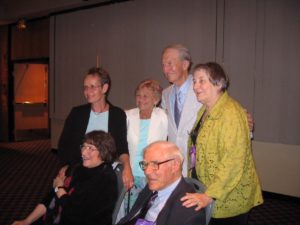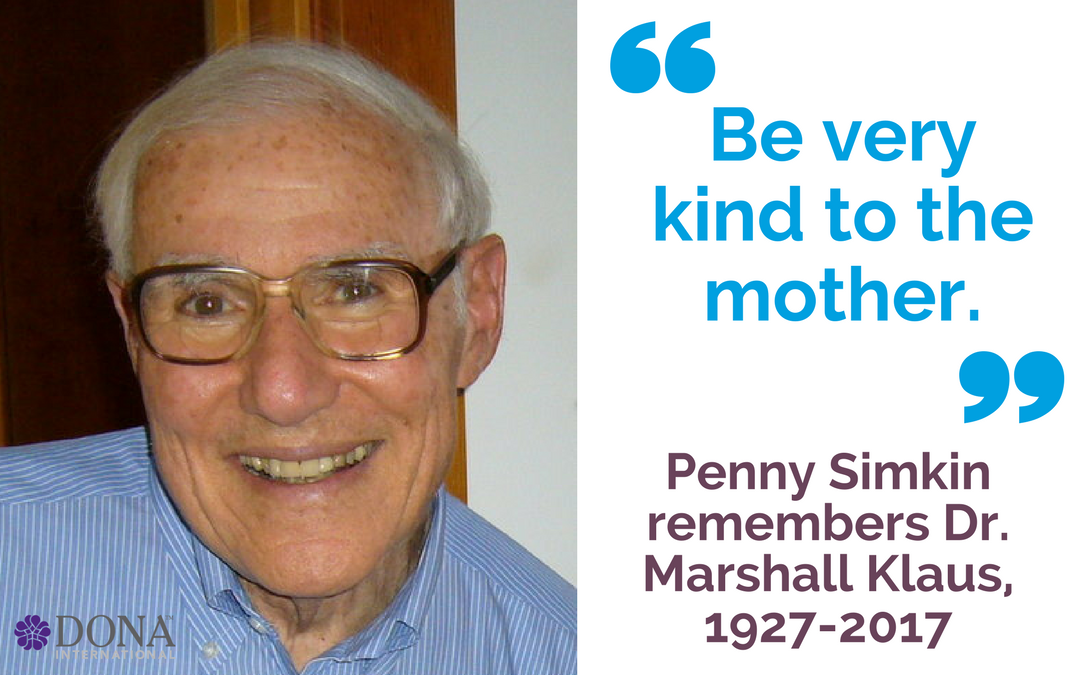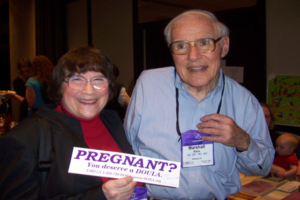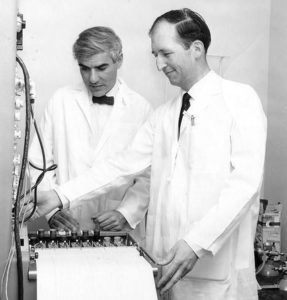By Penny Simkin, PT
Marshall Klaus, MD, friend, and advocate for babies, mothers, parents, and doulas, died recently at his home in Palo Alto. We send our sympathy and love to his family, especially dear Phyllis, his wife and partner in their seminal work.
Marshall Klaus had a profound influence on me by helping me to deeply appreciate the impact of events during the perinatal period on those giving birth, their families, and, by extension, the entire population. I have heard him speak dozens of times, and was privileged to be friends with Marshall and Phyllis over the past thirty plus years.
The first time I heard Marshall speak was in the early 1970s in Lansing, Michigan at an ICEA convention. No presentation has had as enormous an impact on me as that one. I was a fairly new childbirth educator with four young children. Marshall described findings from the research done by him and his long-time friend and colleague, John Kennell (who died a few years ago), which concluded that there is a sensitive period in the first hours after birth, during which mothers and babies are uniquely attentive and attuned to each other, if they are not separated or heavily drugged. He made a convincing case for keeping mothers and babies together. As I listened, I was flabbergasted and immediately recalled, with sadness and regret, my own experiences of separation from my newborn babies. What had we missed by being separated after birth and for much of the first five days of their lives? That question remained with me and with numerous other mothers. It motivated me to become an advocate for mother-infant contact immediately after birth. As Marshall and John refined their understanding of the period, they made it clear that lack of mother-infant contact need not be permanently damaging, but that it is stressful for both and might delay initial adjustment and mutual bonding, especially with mothers at risk for emotional or mental health difficulties. I recall being very reassured by Marshall after I poured my heart out to him about how sad and worried I was that I had had so little time with my new babies, especially my firstborn. He said, “Tell me, did you want him with you?” I cried, “I ached for him!” He replied, “I think the bond was there. Don’t you?” I cherish that memory.
Hospitals were slow to accept and incorporate their evidence-based recommendations for keeping mothers and babies together from birth because they disrupted the efficient “usual care” routines of mothers and babies in the immediate postpartum period. Marshall and John worked tirelessly and passionately to teach this revolutionary message to maternity care providers and the public. Today, 45 years after publication of their first New England Journal of Medicine article on extended contact between mother and infant, “Maternal Attachment – Importance of the First Post-Partum Days, hospitals around the world have adopted some or all of their recommendations. Other researchers, inspired by Marshall and John’s findings, continue to discover other benefits of keeping mothers and babies together. They, along with other great advocates for babies, such as T. Berry Brazelton, changed the way newborn babies are perceived – from “blank slates” to interactive, intelligent, communicative little people, with thoughts and feelings, memories, personalities, and clear preferences for their mothers and close family members.
Although Marshall and John held lofty positions in academic medicine in leading medical schools, they were humble and accessible to childbirth educators and doulas, many of whom have had direct contact with both of them at conferences and meetings. These childbirth advocates spread the word to childbearing people, who pressed their care providers to embrace measures to ensure extensive parent-infant contact, skin-to-skin, from birth.
A second major contribution from Marshall and John was their finding that laboring women and newborn babies have similar basic emotional needs. Their work in the late 1970s and 80s with Guatemalan women reaped unexpected findings. They were studying the potential impact on Guatemalan women and their infants of having a kind person at the birth. While intending to look for effects on breastfeeding and mother-infant bonding, they discovered that being accompanied continuously by a kind, helpful woman during labor (instead of only a busy procedure-focused nurse who was in and out of the room) was also associated with shorter labors, fewer complications, and maternal satisfaction. This was the impetus for numerous randomized controlled trials comparing “usual care” with what we now know as doula care. All the studies have shown benefit, as readers of this post know well.
Marshall and John noted that the behaviors of doulas toward laboring women were very similar to the interactions between mothers and their newborn babies. This observation was reflected in the title of their book about doulas, written with Phyllis, in 1993: “Mothering the Mother: How a Doula Can Help You Have a Shorter, Easier and Healthier Birth.” All the following behaviors are observed between babies and their mothers, and between women in active labor and their doulas: continuous contact with eyes and touch; soothing rhythmic words, sounds, or movements; calm confidence; smiles; entrainment between the two; and other behaviors typical of mothers and doulas. All these behaviors evoke positive responses, while isolation of laboring women and newborn babies has detrimental effects on both.
 One of Marshall’s most memorable quotes was his answer to a doula, who commented that doulas are frustrated over their lack of power to change the actions of hospital personnel who don’t follow best practices to foster bonding and breastfeeding. Doulas must stand by and watch out-of-date practices being followed. If they suggest more evidence-based practices, they may be perceived as troublemakers. Or, sometimes they want to encourage a mother who seems somewhat detached or disinterested in her baby to engage. They worry for the baby’s sake. Asked by the doula, “What can I do to make things better?” Marshall’s answer was, “Be very kind to the mother.” I think about his advice frequently, and am guided by it in my encounters in such situations, because, while there is much we cannot do, we can always be kind to the mother. That kindness, which for some women is rarely felt, may send her a message of worthiness, and in some way model for her how she might respond to her baby. Kindness begets kindness.
One of Marshall’s most memorable quotes was his answer to a doula, who commented that doulas are frustrated over their lack of power to change the actions of hospital personnel who don’t follow best practices to foster bonding and breastfeeding. Doulas must stand by and watch out-of-date practices being followed. If they suggest more evidence-based practices, they may be perceived as troublemakers. Or, sometimes they want to encourage a mother who seems somewhat detached or disinterested in her baby to engage. They worry for the baby’s sake. Asked by the doula, “What can I do to make things better?” Marshall’s answer was, “Be very kind to the mother.” I think about his advice frequently, and am guided by it in my encounters in such situations, because, while there is much we cannot do, we can always be kind to the mother. That kindness, which for some women is rarely felt, may send her a message of worthiness, and in some way model for her how she might respond to her baby. Kindness begets kindness.
I have always been DONA Proud that Marshall was one of our founders! How lucky we were to have his passion, intelligence, endless commitment, broad knowledge, generosity, openness, respect, and KINDNESS! I don’t wish to belittle the contributions of our other founders, but, having just lost this dear man, I want us to celebrate our good fortune to have had him in our lives. We’ll all miss Marshall, but must never forget the lessons he taught and his deep respect and affection for new families and his unique contribution to those families.
In the doula spirit,
Penny Simkin
About Penny Simkin
 Penny Simkin, PT, is a physical therapist who has specialized in childbirth education since 1968. She estimates she has prepared over 14,000 women, couples, and siblings for childbirth, and is a co-founder of DONA International. Today her practice consists of childbirth education, birth counseling, and writing, combined with a busy schedule of conferences and workshops. Penny and her husband, Peter, have four grown children, eight grandchildren, three grandchildren-in-law, two great-grandbabies, and a pug named Lola. Find out more about Penny at her website: www.pennysimkin.com.
Penny Simkin, PT, is a physical therapist who has specialized in childbirth education since 1968. She estimates she has prepared over 14,000 women, couples, and siblings for childbirth, and is a co-founder of DONA International. Today her practice consists of childbirth education, birth counseling, and writing, combined with a busy schedule of conferences and workshops. Penny and her husband, Peter, have four grown children, eight grandchildren, three grandchildren-in-law, two great-grandbabies, and a pug named Lola. Find out more about Penny at her website: www.pennysimkin.com.





My condolences to his family and friends.
I’m so fortunate to have benefitted from his kindness, knowledge and guidance over the years. Let’s all be kind to the “Mother” and to one another….♥️
Beautiful tribute to a wonderful advocate for women and families!
Thank you for this profound wealth of information which I read over and over.
Thank you for your beautiful tribute to my father.
I so appreciate your words of the great work done by Marshall Klauss and the dedicated people to create a new norm for the perinatal experience. I am just entering grandmother-hood and have sought out the book, The Amazing Newborn to give to my daughter-in-law and son. My mother, Beatrice Rowe started the Perinatal Coaching Program in Detroit Michigan and ran up against the same resistance that you mentioned in this article. Dr. Klaus’ support helped to spearhead breakthroughs with the medical and nursing staff at the first hospitals where this was piloted.
He was the starlight we followed for many, many years. Good bye, master